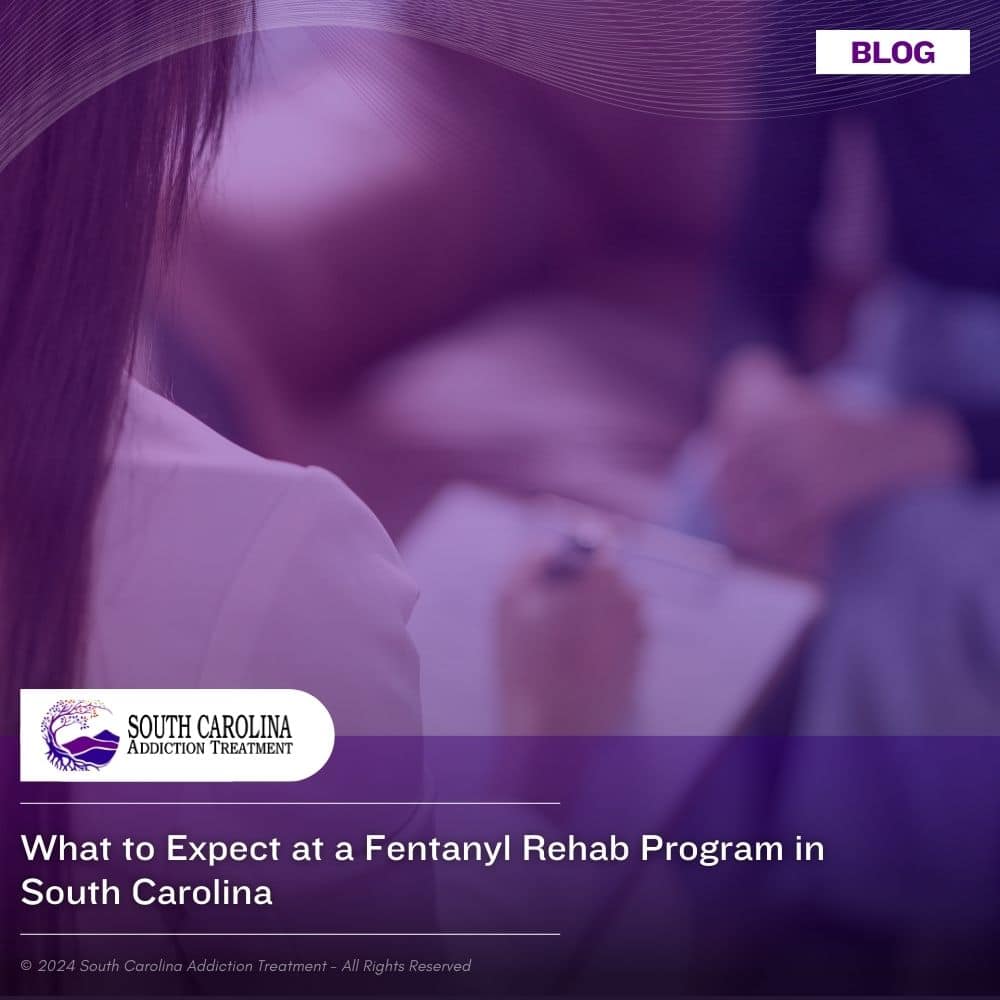What to Expect at a Fentanyl Rehab Program in South Carolina

Medically Verified: 2/1/24
Medical Reviewer
Chief Editor

All of the information on this page has been reviewed and verified by a certified addiction professional.
Fentanyl is a synthetic opioid that is 50 to 100 times more potent than morphine. While fentanyl is used as an adulterant in many drugs, you might abuse it on purpose once you become tolerant of less potent opioids. Either way, fentanyl abuse is incredibly dangerous as it puts you at risk of fatal overdose.
According to the National Institute on Drug Abuse (NIDA), synthetic opioids like fentanyl were responsible for 70,601 overdose deaths in 2021.
If you abuse fentanyl, it’s time to attend an addiction treatment center. Before you commit to substance abuse treatment, you might be wondering what to expect during a fentanyl rehab program in South Carolina. These programs offer a wide array of services, from individualized treatment planning to medication-assisted treatment and behavioral therapies.
How Does Fentanyl Rehab in South Carolina Work?
Opioid use disorder can lead to several long-term health risks, including life-threatening overdoses. When you are abusing fentanyl in particular, your risk of overdosing skyrockets. Thankfully, fentanyl rehab programs in South Carolina can help you achieve and maintain long-term sobriety.
If you are struggling with fentanyl addiction, you should always seek professional treatment. During a fentanyl rehab program in South Carolina, you can expect:
Intake and Assessment
The first step in treating a substance use disorder is being honest about your drug abuse. An admissions counselor will ask you questions about your physical and mental health. They will also ask about your history of fentanyl abuse. This information will create an individualized treatment plan based solely on your needs.
In addition to creating your treatment plan, the admissions counselors will gather your personal information. This might include getting your insurance plan, and your payment information, and having you sign medical release forms.
Medication-Assisted Treatment (MAT)
Most people struggling with opioid addiction require medical detox. If you are experiencing fentanyl withdrawal symptoms, you will participate in medically assisted detox.
During detox, medical staff will monitor your vital signs. They will also prescribe medications to lessen your withdrawal symptoms. Lastly, mental health professionals offer psychological support for any mental health symptoms you are experiencing.
Once you complete detox, you will have the option to participate in medication-assisted treatment (MAT).
MAT combines the use of medications with evidence-based therapies to lessen your chances of relapsing. You might be given a medication like Suboxone. This medication targets opioid receptors to prevent you from experiencing cravings for fentanyl.
Evidence-Based Therapies
Drug addiction can be difficult to overcome without professional help. Oftentimes, fentanyl addiction is triggered by underlying causes like past traumas, untreated mental health conditions, and damaging environmental factors. Thankfully, therapy can help you overcome the factors that influenced you to develop a substance use disorder.
Fentanyl rehab programs use evidence-based therapies to help you overcome your addiction. Examples of clinically proven therapies for addiction include:
- Cognitive behavioral therapy (CBT)
- Motivational interviewing (MI)
- Contingency management (CM)
- 12-step facilitation therapy
- Family behavior therapy
You will engage in both individual therapy and group counseling. Individual therapy is best for overcoming sensitive topics like childhood trauma. On the other hand, group counseling can help you develop important social skills and realize you are not alone.
Holistic Services
Fentanyl rehab facilities also use holistic services to help you recover. Holistic refers to the “whole person.” This means that the treatments are designed to help you recover physically, mentally, and spiritually.
Examples of holistic treatments used during fentanyl treatment facilities include:
- Yoga and meditation
- Massage and acupuncture
- Art and music therapy
- Nutritional counseling
- Exercise and adventure therapy
- And more!
Holistic treatments can lessen your stress levels, keep you focused on the present, and allow you to connect with your mind and body.
Relapse Prevention and Aftercare
Lastly, fentanyl rehab programs use a process called relapse prevention planning. Relapse often occurs right after you leave a treatment program. As a result, rehab centers arm you with healthy coping mechanisms that allow you to avoid a relapse.
In addition to teaching coping mechanisms, a part of relapse prevention is aftercare. Fentanyl rehab centers might offer the following aftercare services:
- Continued therapy
- Medication management for MAT
- Access to alumni support group
- Recommendations on 12-step meetings
- Referrals to outpatient treatment centers
- Case management services like vocational assistance
These services will keep you connected to a recovery community. They also make it easier for you to maintain sobriety once you leave your rehab program.
Get Connected to a South Carolina Fentanyl Rehab Center
If you or a loved one abuse fentanyl, it’s time to seek help. Fentanyl rehab programs can help you regain control over your life. At South Carolina Addiction Treatment Center, our top priority is giving you the support you need to recover.
We offer a combination of detox and inpatient treatment. Whether you need MAT or behavioral therapy, our program is right for you.
Contact us today to learn more about our fentanyl rehab program. We can help you regain control over your life.

